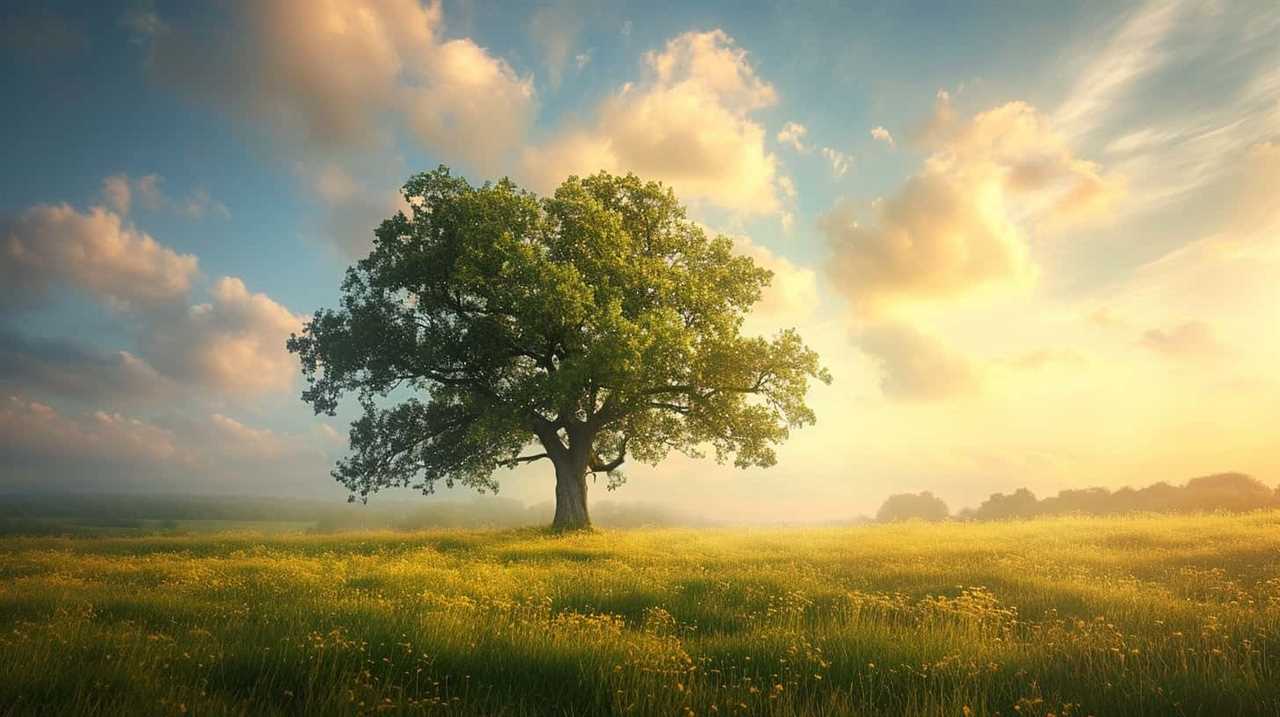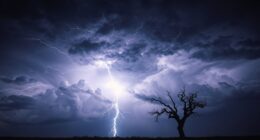Have you ever wondered why poets frequently include elements of nature in their poetry? This isn’t just a random preference; there is a significant reason behind it.
Poets often invoke nature’s imagery because it allows them to convey emotions and experiences in a unique and innovative way. By drawing upon the beauty and symbolism of nature, they are able to tap into a wellspring of inspiration that resonates with their readers.
Nature becomes a metaphor for the human condition, representing the vast range of emotions and experiences that we all go through. Through the use of nature’s imagery, poets are able to create a connection between the external world and our internal experiences, unveiling a deeper understanding of ourselves and the world around us.
Key Takeaways
- Nature serves as a powerful source of inspiration for poets, evoking a range of emotions and sensations.
- Poets often use nature as a metaphor for the passage of time and to gain a deeper understanding of their place in the universe.
- Environmental themes in poetry highlight the interconnectedness of nature and express grief for its destruction, while also promoting nature conservation and raising awareness about the ecological crisis.
- Nature’s beauty and awe-inspiring landscapes have a profound emotional impact, evoking feelings of wonder, providing solace, and stimulating creativity.
Romantic Poets’ Use of Nature Imagery
Romantic poets rely on nature imagery to evoke powerful emotions and create a sense of connection between the reader and the natural world. By incorporating the symbolism of flowers and exploring nature’s healing powers, these poets forge a profound link between the human experience and the natural realm.

The symbolism of flowers plays a significant role in the poetry of the Romantic era. Flowers are often used as metaphors for human emotions, reflecting the delicate and transient nature of both. For example, William Wordsworth’s famous poem ‘I Wandered Lonely as a Cloud’ uses the image of a field of daffodils to convey a sense of joy and inspiration. The vibrant yellow flowers symbolize the beauty and vitality of nature, eliciting a powerful emotional response in the reader.
Furthermore, nature’s healing powers are a recurring theme in Romantic poetry. Poets of this era believed that spending time in nature could restore the soul and provide solace from the trials of life. Samuel Taylor Coleridge, in his poem ‘Frost at Midnight,’ describes the transformative effect of nature’s presence on the human spirit. The peacefulness and serenity of the natural world offer a respite from the chaos and tumult of everyday existence, allowing individuals to find solace and rejuvenation.
Symbolism of Nature in Modern Poetry
To continue exploring the significance of nature imagery in poetry, let’s now delve into the symbolism of nature in modern poetry. Symbolism plays a crucial role in modern poetry, as it allows poets to convey complex emotions and ideas through the use of natural imagery. Here are four ways in which nature is symbolically represented in modern poetry:
- Nature as a reflection of human emotions: Modern poets often use nature as a metaphor for the human condition. Just as nature can be calm and serene, it can also be wild and unpredictable, mirroring the range of emotions experienced by individuals.
- Nature as a symbol of renewal and rebirth: In modern poetry, nature is often used to symbolize the cyclical nature of life. The changing seasons and the growth of plants can represent the process of renewal and the possibility of starting anew.
- Nature as a representation of the sublime: The awe-inspiring beauty and power of nature are frequently depicted in modern poetry as a way to evoke a sense of the sublime. By using nature imagery, poets can tap into the overwhelming feelings of grandeur and transcendence.
- Nature as a reflection of ecological concerns: In today’s world, nature is often used as a symbol to highlight environmental issues. Poets use imagery of damaged landscapes or endangered species to draw attention to the urgent need for conservation and preservation.
In modern poetry, the symbolism of nature allows for a deeper exploration of human emotions, the cycle of life, the sublime, and environmental concerns. Through the use of imagery, poets can create innovative and thought-provoking works that resonate with their audience.

Nature’s Role in Conveying Emotions
Nature serves as a powerful conduit for conveying emotions. Poets have long recognized the ability of nature’s imagery to evoke deep emotional responses in their readers. Whether it’s the sight of a vibrant sunset, the sound of waves crashing on the shore, or the scent of blooming flowers, nature has the power to stir our emotions in profound ways. Through their use of vivid descriptions and rich metaphors, poets are able to tap into this emotional connection and create a bridge between the natural world and the human experience.
Nature’s role in conveying emotions isn’t limited to simply describing the external world. It also serves as a reflection of human emotions, providing a symbolic language through which poets can express their innermost thoughts and feelings. For example, a stormy sea may represent feelings of turmoil and unrest, while a calm meadow may symbolize peace and tranquility. By intertwining the natural world with human emotions, poets are able to create a sense of universality and resonance that speaks to the shared human experience.
Moreover, nature’s imagery allows poets to convey emotions in a way that’s both innovative and evocative. By drawing upon the beauty and power of the natural world, poets are able to tap into a deep well of inspiration and create unique and compelling expressions of emotion. This innovative use of nature’s imagery not only captivates readers, but also challenges traditional notions of poetic language and form.
The Connection Between Nature and Human Experience
As a reader, you can’t help but recognize the profound connection between the natural world and your own human experience. Nature has always played a significant role in shaping our understanding of ourselves and the world around us.

Here are four reasons why the connection between nature and human experience is so powerful:
- Connection between nature and spirituality: Throughout history, people have sought spiritual solace and enlightenment in nature. The awe-inspiring beauty of the natural world can evoke a sense of wonder and transcendence, leading to a deeper connection with the divine.
- Healing power of nature: Nature has a remarkable ability to heal and restore. Whether it’s a walk in the woods, a dip in the ocean, or simply basking in the sunlight, being in nature can reduce stress, improve mood, and promote overall well-being. The sights, sounds, and smells of nature can have a calming effect on our minds and bodies.
- Reflection of human emotions: Nature often serves as a mirror to our own emotional experiences. The changing seasons, the ebb and flow of tides, and the cycle of life and death in nature can parallel the ups and downs of our own lives. This reflection can help us gain perspective and find solace in the universal nature of human emotions.
- Interconnectedness of all life: Nature reminds us of our interconnectedness with the world around us. We aren’t separate from nature; we’re a part of it. By recognizing and honoring this connection, we can cultivate a sense of responsibility and stewardship for the natural world.
Nature as a Source of Inspiration for Poets
The profound connection between the natural world and your own human experience extends to the realm of poetry, inspiring poets to often invoke nature’s imagery. Nature’s influence on poets is undeniable, as it provides them with a wellspring of inspiration that allows them to explore and express the complexities of the human condition.
Nature’s influence on poetic inspiration can be attributed to its ability to evoke a range of emotions and sensations. The beauty and grandeur of nature’s landscapes can stir feelings of awe and wonder, while its cycles of birth, growth, decay, and renewal mirror the ebb and flow of human existence. The changing seasons, the rising and setting of the sun, the rhythmic movement of waves, all serve as powerful metaphors for the passage of time and the transient nature of life.
Moreover, nature’s influence on poetic inspiration lies in its ability to connect poets with something greater than themselves. By immersing themselves in the natural world, poets can tap into a sense of harmony and interconnectedness that transcends the boundaries of individual experience. This connection allows them to gain a deeper understanding of their place in the universe and the universal truths that underpin human existence.

Environmental Themes in Poetry
Explore how poets incorporate environmental themes into their poetry.
Environmental themes in poetry serve as a powerful tool for poets to address the ecological crisis and promote nature conservation. Through their words, poets create a deep connection between human beings and the natural world, shedding light on the urgent need to protect and preserve our environment.
Here are four ways in which poets incorporate environmental themes into their poetry:
- Metaphorical Language: Poets often use vivid and imaginative metaphors to describe the natural world. By comparing elements of nature to human experiences and emotions, they evoke a sense of interconnectedness and highlight the importance of coexistence.
- Elegy for Lost Nature: Many poets mourn the loss of pristine landscapes and species, expressing grief and lamentation for the destruction caused by human activities. Their elegiac poems serve as a powerful reminder of the consequences of our actions and the fragility of the natural world.
- Ecopoetry: This genre of poetry specifically focuses on environmental issues and aims to inspire action and change. Ecopoets often employ a combination of scientific knowledge, emotional depth, and lyrical language to raise awareness and foster a sense of responsibility towards nature.
- Celebration of Nature’s Beauty: Poets also celebrate the intrinsic beauty of the natural world, capturing its awe-inspiring landscapes and diverse ecosystems. By emphasizing the aesthetic value of nature, they inspire a sense of wonder and appreciation, encouraging readers to protect and cherish the environment.
Through their poetry, poets play a crucial role in raising awareness about the ecological crisis and advocating for nature conservation. Their words have the power to inspire change, urging us to rethink our relationship with the environment and take meaningful action to ensure its preservation.

Nature’s Ability to Evoke Beauty and Awe
When it comes to nature’s ability to evoke beauty and awe, you can’t help but be moved by its powerful emotional impact.
From the breathtaking landscapes to the serene wilderness, poets find a deep connection to nature that enables them to express the beauty they see and feel.
It’s through this connection that they’re able to capture and convey the profound sense of awe and wonder that nature inspires.
Nature’s Powerful Emotional Impact
Experience the overwhelming beauty and awe-inspiring power of nature through the evocative imagery often invoked by poets. Nature has a profound emotional impact on individuals, stirring up deep feelings of beauty and awe. Here are four reasons why nature’s ability to evoke these emotions is so powerful:

- Transcendence: Nature has the power to transport us beyond our ordinary experiences and connect us to something greater than ourselves. It allows us to transcend our daily concerns and experience a sense of awe and wonder.
- Healing: Nature has a powerful healing effect on our emotions. Its beauty and tranquility can provide solace and comfort during times of distress, offering a respite from the chaos of everyday life.
- Inspiration: Nature’s beauty has the ability to inspire creativity and innovation. It stimulates our senses and sparks our imagination, leading to new ideas and perspectives.
- Connection: Nature brings us closer to the natural world and reminds us of our place in the larger web of life. It fosters a sense of interconnectedness and unity, leading to a greater appreciation for the beauty and diversity of our planet.
Through these emotional experiences, nature’s imagery in poetry allows us to tap into the transformative power of the natural world and connect with something deeper within ourselves.
Poetic Connection to Landscapes
Poets often invoke nature’s imagery to capture the breathtaking beauty and awe-inspiring power of landscapes. The poetic connection to landscapes stems from nature’s influence on human emotions and the profound impact it has on our senses.
By using vivid descriptions and metaphors, poets create a sensory experience that transports readers to these poetic landscapes. Nature’s ability to evoke beauty and awe lies in its ability to awaken our senses and stir our emotions.
The vastness of a mountain range, the serenity of a calm lake, or the vibrant colors of a sunset all have the power to inspire wonder and awe. Through their words, poets invite us to appreciate the grandeur and magnificence of nature, reminding us of our place within the larger world and stirring our sense of awe and reverence for the natural world.

Beauty Found in Wilderness
As you explore the beauty found in wilderness, let nature’s ability to evoke beauty and awe captivate your senses. The vastness and untouched splendor of the wilderness can offer a profound connection to the natural world, leaving you in awe of its beauty.
Here are four reasons why beauty in solitude and wilderness exploration can be so captivating:
- Immersion in nature allows you to escape the noise and distractions of modern life, creating a space for reflection and rejuvenation.
- The wilderness offers a diverse array of landscapes, from towering mountains to tranquil lakes, each with its own unique beauty that can inspire and uplift.
- Being in nature allows you to witness the intricate details of the natural world, from the delicate petals of a wildflower to the mesmerizing patterns of a flowing river.
- The solitude found in the wilderness can awaken a sense of wonder and appreciation for the world around you, reminding you of the awe-inspiring power of nature.
Nature as a Metaphor for the Human Condition
Nature serves as a powerful metaphor for understanding the complexities of the human condition. Poets often invoke nature’s imagery to explore and express the depths of our emotions, our struggles, and our growth as individuals. Nature, with its cycles of life and death, mirrors the ebb and flow of human existence. Just as flowers bloom and wither, so do we experience moments of joy and sorrow, growth and decay.
In nature, we can find solace and healing. The soothing sounds of waves crashing on the shore, the gentle rustling of leaves in the wind, or the vibrant colors of a sunrise can bring us a sense of peace and tranquility. Similarly, in times of hardship and pain, nature’s resilience can remind us of our own ability to overcome adversity and find strength within ourselves.

Moreover, nature’s constant transformation and adaptation can be seen as a reflection of our own personal growth and development. Just as trees shed their leaves in the fall and sprout new ones in the spring, we too shed old habits and beliefs to make room for new experiences and perspectives.
The Transcendental Qualities of Nature in Poetry
Immerse yourself in the poetry of nature, where the transcendental qualities of the natural world transport you beyond the boundaries of everyday existence.
Nature has long been a source of inspiration for poets, and its portrayal in their works often reflects the influence of transcendentalism and the belief in the inherent divinity of the natural world.
Here are four reasons why nature is often depicted as possessing transcendental qualities in poetry:

- Transcendentalism’s influence on nature imagery: Transcendentalism, a philosophical movement that emerged in the 19th century, emphasized the spiritual and intuitive connection between humans and nature. Poets, influenced by this movement, sought to capture the transcendental qualities of nature in their verses, depicting it as a source of spiritual awakening and enlightenment.
- Nature as a reflection of the divine: Many poets view nature as a manifestation of the divine, a reflection of God’s beauty and power. By invoking nature’s imagery, poets attempt to convey the awe-inspiring and transcendent aspects of the natural world, inviting readers to contemplate the divine presence within it.
- Escape from the mundane: Nature’s transcendental qualities offer an escape from the monotony and limitations of everyday life. Through the vivid descriptions of landscapes, seasons, and natural phenomena, poets transport readers to a realm where they can momentarily transcend their earthly concerns and experience a deeper connection with the universe.
- Symbolism and metaphor: Nature’s transcendental qualities lend themselves well to symbolism and metaphor. By using elements of nature to represent abstract concepts or human emotions, poets create a bridge between the tangible and intangible, inviting readers to explore deeper layers of meaning and enriching their understanding of the human experience.
Frequently Asked Questions
How Does Nature Imagery Differ Between Romantic Poets and Modern Poets?
Nature imagery in romantic and modern poetry differs due to the influence of industrialization. Modern poets depict a damaged and exploited nature, reflecting the negative impact of technology. Industrialization altered the way poets perceive and portray nature, highlighting its vulnerability and the need for preservation.
What Are Some Specific Examples of Environmental Themes in Poetry?
Incorporating symbolism in their work, poets often explore environmental themes. They use imagery to highlight ecological destruction, and convey the impacts of climate change. This analytical approach appeals to audiences seeking innovative insights.
Are There Any Negative Emotions or Experiences That Poets Convey Through Nature Imagery?
When poets evoke nature’s imagery, they often convey negative emotions and experiences. By intertwining personal encounters with the natural world, they create a profound impact and offer a unique perspective on human suffering and the complexities of existence.
Can You Explain the Concept of Nature as a Metaphor for the Human Condition in Poetry?
In poetry, nature serves as a metaphor for the human condition. It reflects the complexities of our emotions and experiences. For example, a stormy sea may symbolize inner turmoil, allowing us to explore and understand our own struggles through the power of nature’s imagery.

Are There Any Specific Transcendental Qualities of Nature That Are Commonly Explored in Poetry?
When exploring the transcendental qualities of nature, poets commonly delve into its profound connection with the divine. Through vivid imagery and symbolism, they capture the awe-inspiring power and spiritual resonance that nature possesses.
Conclusion
In conclusion, poets often invoke nature’s imagery for various reasons. It serves as a powerful symbol, conveying emotions and representing the human experience. Additionally, nature acts as a source of inspiration, evoking beauty and awe in the minds of poets. It also serves as a metaphor for the human condition, reflecting our connection to the natural world.
Furthermore, environmental themes in poetry highlight the importance of nature’s preservation. Ultimately, nature’s transcendental qualities enable poets to explore deeper insights and engage readers in a profound way, as the ancient adage goes, ‘In nature, you find yourself.’
Lauren’s talent in writing is matched by her passion for storytelling. Her love for books and deep understanding of culture and entertainment add a distinct flavor to her work. As our media and press contact, Lauren skillfully bridges the gap between afterQuotes and the broader media landscape, bringing our message to a wider audience.










